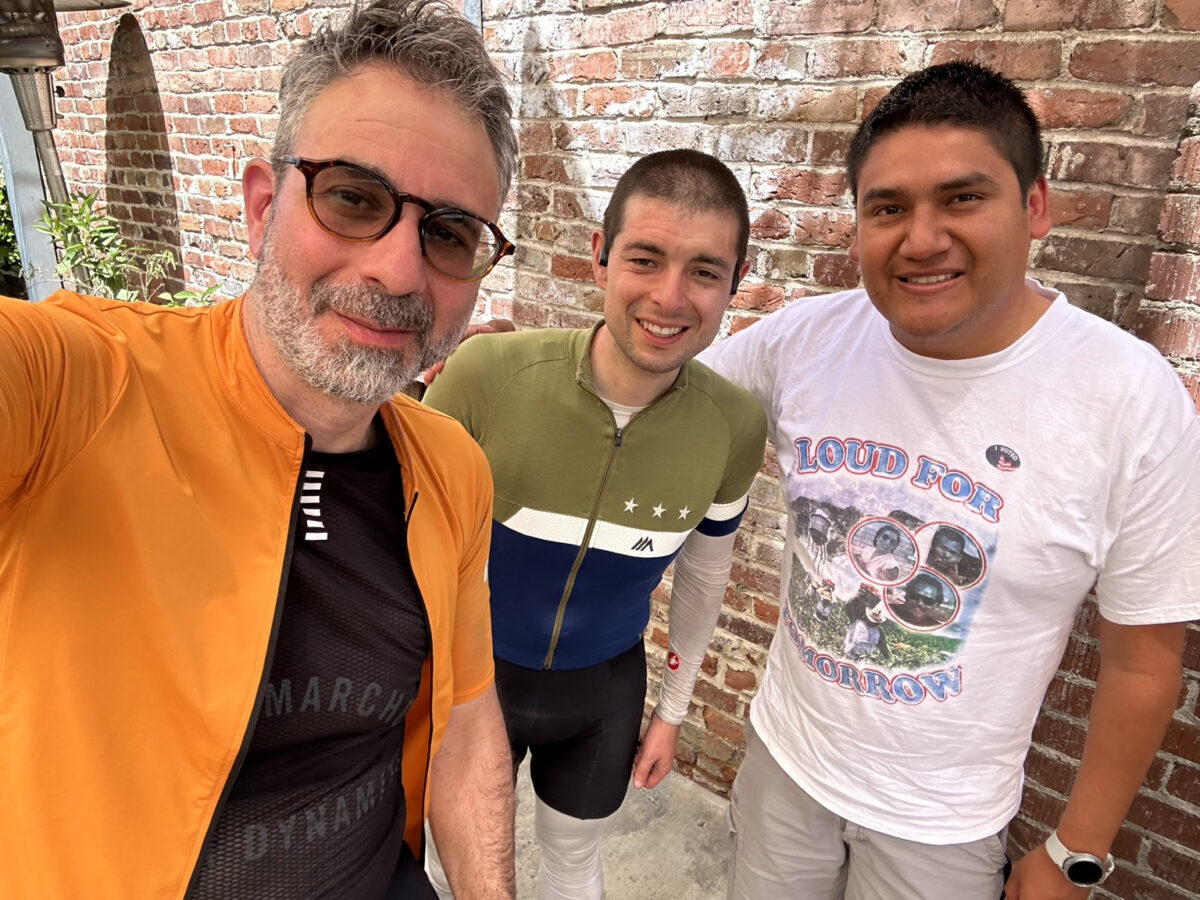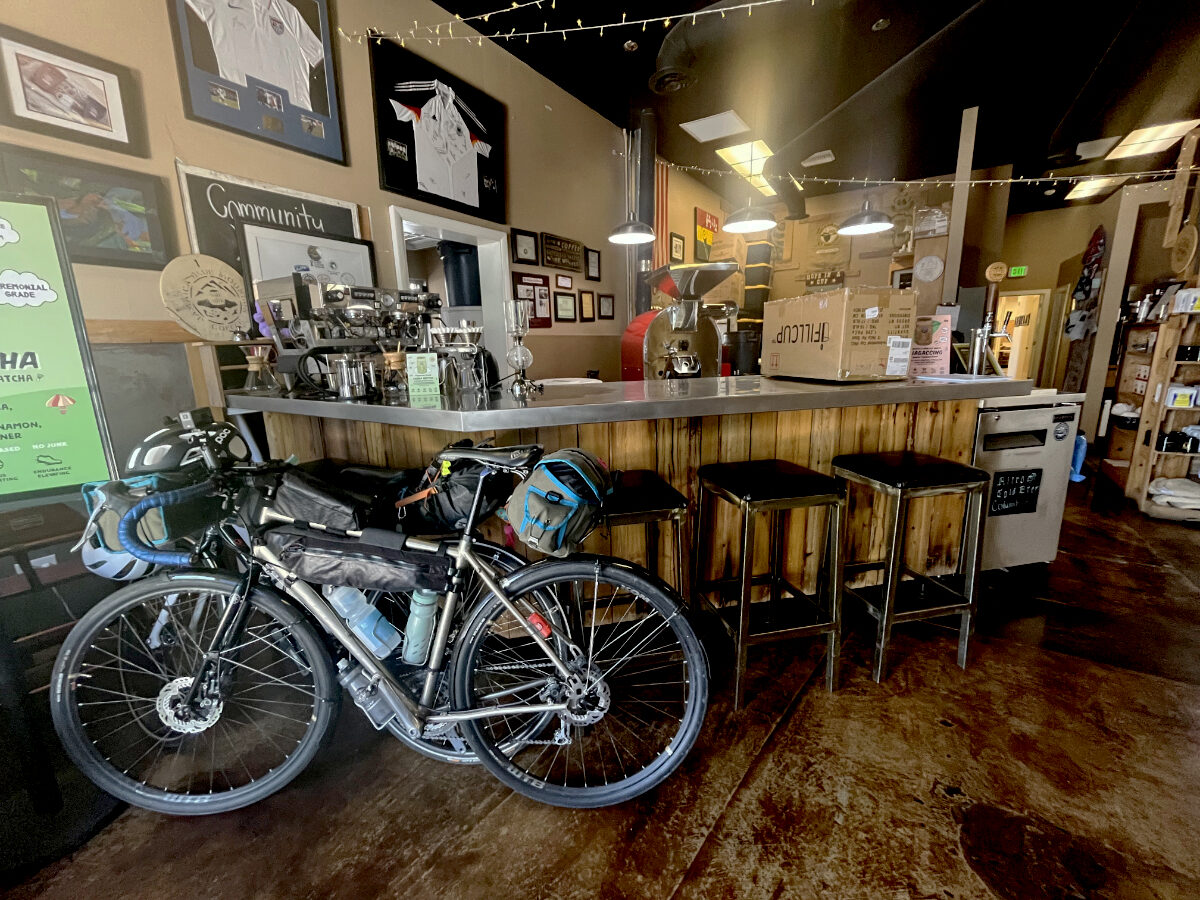Randy Villegas is a “boomerang”—someone who came back after finishing their degree
Originally published on Global Voices

(L to R) Ivan Sigal, Nathan Matias, and college professor and school board member Randy Villegas in Visalia, California. Photo by Ivan Sigal (CC BY 4.0)
This article is part of a series by J. Nathan Matias for a 500+ mile bicycle ride in June 2023 that is raising funds for Rising Voices, Global Voices’ endangered/Indigenous language program, and the Central California Environmental Justice Network. Donate to the initiative here.
When Randy Villegas explains the reasons not to live in California’s Central Valley, you can tell from his urgent enthusiasm that he’s about to convince you the opposite.
Randy starts by reviewing the challenges facing young people who grow up in towns like Visalia, where Ivan Sigal and I are meeting him along our 550-plus mile bicycle ride following the routes of the 1966 Farmworkers March. Later in the evening, he tells us, he will be awarding diplomas at a high school graduation as the only Latinx school board member in a majority-Latinx town.
How can so many people be represented so unequally? The reasons are many, Randy says, but two important factors are people’s understanding of elections and whether they believed it would make a difference. In Visalia only 6% of Latinx people have a bachelor’s degree–the second lowest rate in the US after nearby Bakersfield (5%). Only one-third of high school students in Visalia qualify to apply for university, and the closest institutions with four-year programs are an hour away. Before Randy’s own parents obtained U.S. citizenship, he worried about leaving them without help to navigate unexpected crises. Similar fears prevent many students from attending college even when they do qualify.
Graduates who do go on to get a four-year degree sometimes don’t see a future for them back home. And why would they, in a conservative region with so much inequality, Randy asks. So even with university degrees on the rise among Latinx young people in mixed-status families, they remain a small minority among the region’s professionals and civic leaders.
This is the moment in our conversation when I realized Randy was making a positive case for staying, the one he makes to his students at the College of the Sequoias, where he is a professor of political science. He tells us story after story of things that people might consider discouraging—the nearby town that only recently changed its racist school mascot, the propaganda campaigns posing as legitimate newspapers, the conflict over the Visalia school district’s very first Pride Month, and a recent attempt to demolish people’s homes for a golf course. But for each of these there’s a counter-story of someone who took the time to stand up for their community and won.
“This is where the fight is,” Randy tells us, pointing out endless ways to make a difference through local affairs. In his view, the Central Valley is full of opportunities to improve the lives of people who have historically been excluded from civic life. And if there’s so much work still to be done, that’s only evidence that small changes can make a big difference.
Political scientists tend to believe, Randy tells us, that young people with family members who are not U.S. citizens are less likely to be civically engaged because they can’t learn it from their parents. But after conducting years of interviews and campaigns in the Central Valley for his PhD research, Randy saw first-hand how community organizations and young people themselves can foster powerful forms of civic participation.

Nathan's and Ivan's bikes in a coffee shop in California's Central Valley. Photo by J. Nathan Matias.
Social scientists often think that people with few resources struggle to be effective politically, but Randy has seen first-hand what Chris Zepeda-Millán describes in the article on “Weapons of the (Not So) Weak: Immigrant Mass Mobilization in the US South””—how people can mobilize for change when they face a common challenge and have strong support networks. Randy glows as he tells us about 99 Rootz, who are supporting Latinx young people to participate in civic life in the farm towns along Route 99 in ways that also prepare them for university. I also notice he’s wearing a t-shirt bearing the logo of “Loud 4 Tomorrow,” a Delano-based group that’s working to transform the region’s schools by organizing young voters.
Even if his arguments weren’t so persuasive, Randy’s life story and enthusiasm are themselves a powerful example that should encourage students to return to the Central Valley to take up roles as civic leaders. He’s what Melissa Montalvo, a Fresno-based reporter, calls a “boomerang”—someone who came back after finishing their degree. Instead of seeking a tenure-track position at a major research university, Randy moved to Visalia, where he now teaches political science at two local community colleges in Tulare County. As a member of the school board, Randy works on providing pathways to higher education for local students. As a professor, the five classes he teaches per semester supports those same students to achieve their leadership potential.
Soon it’s time for Ivan and me to get back on the road. We still have hundreds of miles on our journey to trace other moments of solidarity, community, and civic leadership in the footsteps of the 1966 Farmworkers march. As we pedal north, and as Randy prepares to hand out diplomas, I feel my perspective shifting. Having come in search of a legendary past, I’m finding myself even more excited about the future of this beautiful, heartbreaking, complicated region.
Read more background about the ride, including its goals and Nathan and Ivan's itinerary, at our special coverage page.
Post a Comment